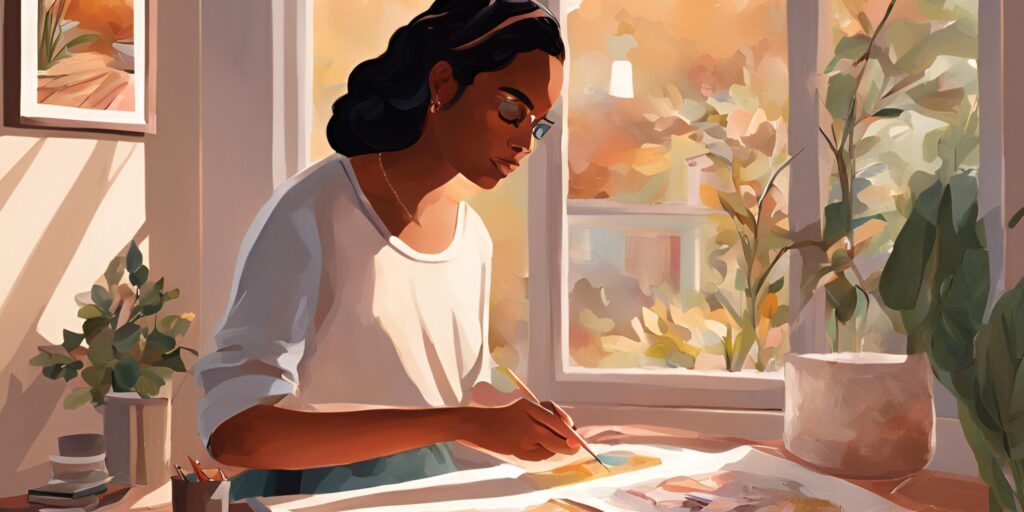Last Updated on March 17, 2025 by MishaOriginalsArt
Custom art commissions offer a unique opportunity to transform your personal vision into a tangible piece of art. Whether you’re seeking a special gift, a statement piece for your home, or a unique project to commemorate a significant event, understanding the commissioning process is essential.
In this guide, we will delve deep into the world of custom art commissions, covering everything from key considerations and the commissioning process to FAQs and tips for finding the right artist.
What Are Custom Art Commissions?

Custom art commissions are arrangements where clients hire artists to create unique pieces of artwork tailored specifically to their preferences.
This can include a wide range of artistic forms such as paintings, illustrations, sculptures, digital art, and more. The beauty of custom commissions lies in their personalization; you can collaborate with an artist to create something that resonates with your individual taste and requirements.
The Benefits of Custom Art Commissions
- Personalization: One of the most significant advantages of custom art is its personalized nature. You can dictate the subject matter, style, color palette, and even the medium used.
- Unique Artwork: Unlike mass-produced pieces, commissioned art is one-of-a-kind. You won’t find another piece like it anywhere else.
- Meaningful Gifts: Custom art makes for thoughtful gifts that show you’ve put time and effort into selecting something special for your loved ones.
- Support for Artists: By commissioning artwork, you’re directly supporting artists and their craft, helping them sustain their creative endeavors.
- Creative Collaboration: Working with an artist allows you to engage in a creative process that can be both fulfilling and enlightening.
6 Key Considerations When Looking for Custom Art Commissions
Here are some key considerations to think about when looking for custom commissions:
1. Define Your Artistic Vision
Before reaching out to artists, take some time to define what you want from your commission. Consider the following:
- Subject Matter: What do you want the artwork to depict? This could be anything from a portrait of a loved one to an abstract representation of emotions.
- Style: Think about the artistic style that appeals to you. Are you drawn to realism, impressionism, abstract art, or perhaps something more whimsical?
- Medium: Decide on the medium you prefer—oil painting, watercolor, acrylics, digital art, or mixed media.
Creating a mood board or collecting reference images can help clarify your vision and serve as inspiration for both you and the artist.
2. Finding the Right Artist
Finding an artist whose style aligns with your vision is crucial for a successful commission. Here are some tips:
- Research: Use social media platforms like Instagram, Pinterest, or dedicated art websites such as DeviantArt or ArtStation to discover artists whose work resonates with you.
- Portfolio Review: Examine artists’ portfolios closely. Look for consistency in quality and style across their works.
- Read Reviews: Check feedback from previous clients to gauge their experiences regarding communication, professionalism, and satisfaction with the final product.
- Engage with Artists: Don’t hesitate to reach out to potential artists with questions about their process or availability before making a decision.
3. Budgeting for Your Commission
Budgeting is an essential part of the commissioning process. Here’s how to approach it:
- Understand Pricing Structures: Many artists have established pricing based on size, complexity, medium, and time required for completion. Familiarize yourself with these factors.
- Set a Realistic Budget: Determine how much you are willing to spend on your commission. Be open about your budget when discussing options with artists.
- Consider Additional Costs: Factor in potential extra costs such as shipping fees (if applicable), framing options, or any modifications you may request during the process.
4. Establishing a Timeline
Discussing timelines upfront is vital for ensuring that both you and the artist are on the same page regarding deadlines:
- Completion Timeframe: Inquire about how long it typically takes for the artist to complete commissions similar to yours.
- Important Dates: If your piece is intended as a gift or needs to be completed by a specific date (like an anniversary), communicate this clearly.
- Flexibility: Understand that artistic processes can vary; some artists may require more time than others depending on their workload and creative approach.
5. Communication Is Key
Effective communication throughout the commissioning process can significantly enhance your experience:
- Initial Discussion: Start with a detailed discussion about your vision and expectations. Be clear about what you want but also open to the artist’s suggestions.
- Regular Updates: Request periodic updates on progress; many artists share work-in-progress images that allow you to provide feedback along the way.
- Feedback Loop: Be respectful in your feedback—constructive criticism can help refine the artwork without discouraging the artist.
6. Payment Terms
Understanding payment terms is crucial before entering into any agreement:
- Deposit Requirements: Many artists require an upfront deposit (often 30%–50% of the total price) before commencing work.
- Payment Methods: Discuss acceptable payment methods—some artists may prefer PayPal or bank transfers while others might accept credit cards or other platforms.
- Final Payment: Clarify when final payments are due—typically upon completion but sometimes before shipping if applicable.
Custom Art Commission is Just Steps Away
Commissioning custom art is not just about acquiring a unique piece; it’s about engaging in a creative collaboration that results in something truly special and meaningful.
By understanding key considerations such as defining your vision, finding the right artist, budgeting appropriately, establishing timelines, maintaining open communication, and clarifying payment terms, you set yourself up for success in this exciting journey.
Embrace this opportunity to support talented artists while creating something that reflects your personal taste and story! Whether it’s for yourself or as a gift for someone special, custom art commissions can lead to cherished pieces that hold lasting value in both aesthetics and sentimentality.
Happy commissioning!
How Long Does It Take to Complete a Commissioned Piece?
The timeline varies based on several factors:
- Artist’s workload
- Complexity of the piece
- Size of the artwork
Generally speaking, commissions can take anywhere from a few weeks to several months. It’s always best to discuss timelines with your chosen artist early in the process.
Can I Request Changes During the Creation Process?
Most artists welcome feedback during creation but be mindful of how much change is requested:
- Initial sketches may allow for more flexibility in adjustments.
- Once significant progress has been made (e.g., color application), changes may be limited.
Open communication is vital here; discuss how changes will be handled upfront.
What If I Don’t Like the Final Piece?
To mitigate dissatisfaction:
- Clearly outline expectations at the beginning.
- Maintain open communication throughout the process.
If issues arise with the final piece:
- Discuss them respectfully with your artist; they may offer revisions based on your feedback.
However, be aware that some artists may have policies regarding refunds or revisions outlined in their contracts.
How Do I Protect Myself When Commissioning Art?
To ensure a smooth commissioning experience:
- Research thoroughly—check reviews and references if necessary.
- Get everything in writing—a contract outlining expectations (scope of work, payment terms) helps protect both parties.
- Maintain open communication throughout the process; transparency builds trust.
Tips for Finding Your Ideal Artist
Finding an artist who resonates with your vision can be challenging but rewarding. Here are additional tips:
- Attend Local Art Shows or Markets: Engaging directly with artists at local events allows you to see their work up close and discuss potential commissions face-to-face.
- Join Online Art Communities: Platforms like Reddit’s r/ArtCommission or Facebook groups dedicated to art commissions can connect you with various artists looking for opportunities.
- Utilize Commission Platforms: Websites like Etsy or Fiverr allow you to browse through numerous artists offering commission services at various price points.
- Ask for Recommendations: If you know someone who has commissioned art before, ask them about their experiences and if they would recommend their artist.
Follow Your Favorite Artists on Social Media: Many artists post about their availability for commissions on platforms like Instagram or Twitter—following them keeps you updated on opportunities.

